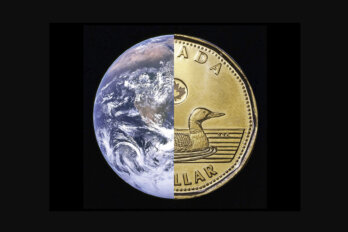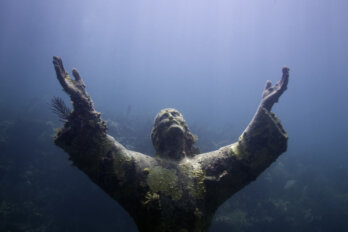My favourite part of the St. Catharines Climate Strike Rally, which took place September 27, 2019, in conjunction with the global climate strike, was a young boy who took the stage. These kids were eager to get on the mic, and not for selfish purposes; it was clear they really cared about climate justice. And fair enough. It’s their future that looks the bleakest, after all, and many of them are currently suffering from an existential dread that no child should ever have to contend with. Most of us didn’t grow up wondering if we were going to make it to adulthood.
Anyway, this one kid got on the mic and went off on a clumsy rant about the use of plastic. “Plastic?! What even is this? What the heck!” It sounded silly, but he had amazing insights. He pointed out that there are many biodegradable alternatives to plastic—so many, in fact, that there is no good reason why so much of the stuff should be ending up in the ocean. We have the science, the innovative brainpower, to create options that wouldn’t harm ocean life. Part of my reaction to this kid’s talk was weirdly maternal, but the other part was sadness. When I was a child, I wasn’t thinking about the ills of pollution. Sure, we learned about recycling in school, and loving the planet, and not being a litterbug. But we lived in blissful ignorance that the planet was being degraded and that it was only a matter of time before that degradation became irreversible.
I was in St. Catharines for a mini art show I was doing at a café owned by a friend of a friend. Bummed that I was missing the Toronto Climate Strike, I asked my friend if anything was happening locally. Before she could even get back to me, I got a message from one of the organizers. They’d learned I was going to be in town for the show and asked if I would speak for a few minutes at the rally. I jumped at the opportunity; I even had a poem I’d written about climate justice that I was prepared to read. But this kid musing over a piece of plastic garbage he found on the ground, loudly exclaiming “What the heck!” over and over, was ten times better than anything I have ever written. Kids had skipped school to attend this strike. I looked at my friends. “Why didn’t we do this stuff?” I asked.
“We didn’t know.”
It’s true, to a degree. I was in high school when Stephen Harper was prime minister, and his government put gags on a lot of Canada’s climate scientists. These educated, intelligent, aware human beings weren’t permitted to speak out on the dangers of prioritizing profit over the well-being of our planet. What if they’d been free to sound off? Would we have been organizing strikes and marches too? I want to believe we would have been, but I’m not so sure. It was a different time. We didn’t have today’s young activists to look up to, the Autumn Peltiers and Greta Thunbergs. Kids today are lucky and unlucky—lucky that they have role models like this to galvanize them, but unlucky that there’s a need to be galvanized in the first place. When I was around the age of the young boy who took the mic, my biggest concern was missing the latest episode of That’s So Raven. I thought the height of activism was carrying that little UNICEF box when we went trick-or-treating. My anxieties centred on getting whipped in the face by a jump rope during double dutch at recess. And we were angriest at the school administration when they banned Red Rover because some kid in another school had apparently broken his arm while playing. When I first skipped school, it was to go to the mall, and I felt super guilty afterward.
This is the simplicity of childhood. It’s not that I didn’t think about complicated things or that I had the perfect life. It’s just that I didn’t worry about the possibility of a nonexistent future. I dreamt without concern of what the world would look like in my twenties and thirties. I assumed it would only get better.
Now, I have legitimate dread about the future. My friends and I joke, “What’s the point of saving for a home when we’re going to be living in a postapocalyptic hellscape anyway?” It’s easy to let climate apathy overtake you; it’s easy to wonder if there’s any point in fighting. Rent is too high, wages haven’t matched inflation on the cost of living, the world is burning, fanboys ruined the magic of Star Wars, and Cats was the scariest movie ever made. So what’s the point of living?
I have two reasons to keep on fighting. One is spite. I refuse to give in to the inaction and greed of the world’s richest people. How can we allow our beautiful planet and our lives to be ruined by a wealthy, resource-hoarding elite that is undoubtedly complicit? The answer is that we can’t.
The second reason is the little boy at the climate march. After the rally, as my friends and I walked to the local deli to get lunch, we couldn’t help but repeat his words: “Plastic! What the heck!” It was like a war cry. We felt his frustration. If he was angry, we had a responsibility to make his anger echo. If you can’t feel rage over the pillaging of the planet, what then? If the cries of children who worry that they may never see their adulthood don’t worry you, what will? If you’re apathetic about your future, don’t be apathetic about his. Perhaps the reason we millennials are in the situation we are is the apathy of the generations before us. I know Generation Z can be annoying, with all their TikToks and confusing lingo. I know sometimes it’s tempting to yell, “Get off my lawn, you damn teenagers!” But it’s worth remembering that they are also more aware of the ills of the world than many of us were at their age—and seemingly more willing to do something about it. Maybe that excuses a bit of hooliganism now and again.
It’s like that iconic Simpsons episode where Homer changes Mr. Burns’s ominous workplace message from “Don’t Forget You’re Here Forever” to “Do It For Her,” with the her in question being his daughter Maggie. Take a tip from Homer and do it for the little boy who doesn’t understand what the fucking point of plastic is. Do it for him.
Excerpted from Small, Broke, and Kind of Dirty: Affirmations for the Real World by Hana Shafi. Copyright © 2020 Hana Shafi. Published by Book*hug Press. Reproduced by arrangement with the publisher. All rights reserved.





